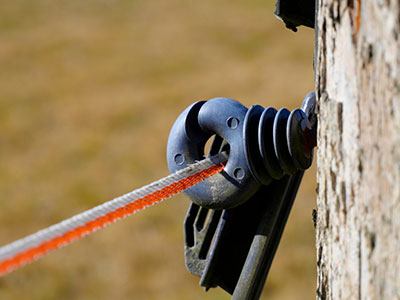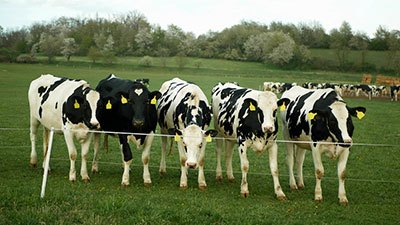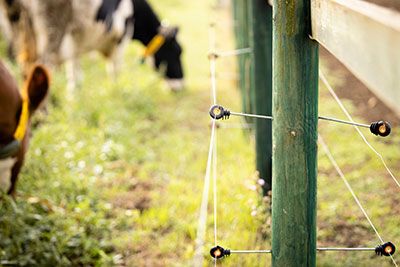Are you wondering which electric fence is better for your farm: rope or wire? The answer depends on a variety of factors, including the type of animal being contained, the terrain, climate changes, and other aspects.
We’ll break down the differences between electric fence rope and wire—from the pros to some possible drawbacks. Ultimately you’ll be able to decide which type is right for your property after understanding its benefits and limitations.
Take away key points:
- The wire rope, tape, and similar methods are cost-effective methods for perimeter fencing and similar fencing systems
- You must know precisely the use of the tools to ensure the best fencing standards
- Read below to find all similarities and differences between these methods
Table of Contents
Best solutions the electric fencing offers: Let’s learn together!
If you’re not sure what would effectively carry the electric charge long distances, and ensure your electric fence system works properly, read below. We will answer all your questions.
The differences between electric fence tape, wire, and rope
Electric fencing is a popular choice for many farmers and ranchers looking to keep their livestock safe and secure.
But what are the differences between electric fence tape, wire, and rope?

1. Electric fence tape
Electric fence tape is wider than electric rope or wire fencing, providing a more visual deterrent to livestock. The metal conductor is woven into the plastic tape, making it more visible and easier to install than traditional wire fence or rope fencing.
The poly tape also has a higher breaking strength than either of the other two options, making it ideal for larger animals such as horses or cattle. The brown or green tape is also highly visible in the snow background, while the white tape is more advisable in green vegetation and brown landscape.
They are a good solution for fast-moving animals, and you can combine white tape, and brown or green tape to meet your green vegetation or other conditions.
2. Electric fence wire
Wire fencing is typically used in smaller areas where visibility isn’t as important. The wire fence is also less expensive than tape or rope, but it does require more maintenance. You need to check it regularly for breaks so as not to suffer wind damage. Fence wire can also be harder to install since it needs to be strung out along posts or other structures.
Wire fences can be made of aluminum wire, steel wire high-tensile wire (barbed wire), poly wire, and other models. The galvanized steel offers a better economical solution, effectively carrying the shock through the electric fences.
The aluminum wire tension offers superior conducting capabilities – four times as much as galvanised steel and uses a lifetime warranty. Aluminum also offers a better electrical conductor than stainless steel. But, it’s a less cost-effective method than the galvanized steel electric fencing offers.
Electric fencing rope
Rope fencing is usually used in smaller areas where visibility isn’t as important and the cost isn’t a factor. Rope fences are easy to install and provide good protection from predators, as they also contain stainless steel for more durability.
However, they don’t offer much in terms of enhanced visibility or deterrence against larger animals like horses or cattle. They might be better for slow animals and strip grazing.
When choosing an electric fence option, consider your specific needs and budget before making a decision. Electric fence tape, wire, and rope all have their advantages and disadvantages, so make sure you weigh them carefully before investing in any one type of electric fence system.
3. High-tensile wire fencing
High-tensile wire fencing is a type of permanent fencing solution that is becoming increasingly popular for agricultural and livestock applications. It is made from high-carbon steel wire with carbon content, giving it a higher tensile strength than other types of fencing. This makes it ideal for long-term use and constructing perimeter fencing. The steel wire fencing won’t sag or become damaged over time.
High-tensile wire fencing also has superior conducting capabilities, allowing for the installation of electric fences to keep fast-moving animals or slow animals contained and deter predators. You can adjust the tightener to maintain wire tension.
The installation process for high-tensile wire fencing requires special attention to detail to ensure the fence will remain secure and effective. The wire offers low maintenance and it’s ideal for perimeter fences.
Pressure-treated fence posts should be installed at regular intervals, and the wire should be tensioned between 150 to 200 pounds to prevent sagging or damage.
It is also important to choose the right type of wire for your application. The smooth wire is better suited for pasture fencing, while barbed wire may be more appropriate for containing livestock.
Electric fence wire vs. polywire

When it comes to electric fencing, there are two main options: electric fence wire and electric poly wire fencing. Electric fence wire is made of high-tensile galvanized steel wire and is designed to be durable and long-lasting. It is also heavier than poly wire, making it more difficult to install.
Electric poly wire fencing is a lightweight alternative that consists of several strands of stainless steel woven into a plastic core. This makes poly fencing easier to install but also less durable than fence wire.
When choosing between the two types of fencing, consider your needs and budget. Electric fence wire may be more expensive but will last longer, while poly fencing is a cheaper option that may need replacing sooner. Additionally, poly wire is highly visible, keeping animals away from the fence line, and galvanized steel wire is ideal for constructing perimeter fences.
No matter which types you choose, both electric fence wire and poly wire can provide effective protection for your property or livestock. Make sure to research the best option for your situation before making a decision.
Electric fence rope or tape?
Electric fence poly tape is a popular choice for its visual deterrent and ease of installation, while the rope offers more flexibility and can be used in windy areas.
Electric poly tape is wider than rope or poly wire fencing, making it a more visible deterrent to livestock. The fence line is also ideal for horse fencing. The metal conductor of the electric poly tape is also easier to handle, install and repair than wire. The specially designed splicer buckles also offer more convenience for tape usage and maintain tape tension.
However, as the tape is not as effective as the electric poly tape or a poly braid fence, it may not be suitable for permanent fences over large areas. So, the regular tape is only good for temporary fencing solutions. Besides, the poly tape is available in a thicker or thinner width, with wider tape costing more.
Electric fence poly rope has the advantage of being more flexible than wire or poly tape and can be used in windier areas as it provides less wind damage. Due to its enhanced visibility, the poly rope fence is ideal for constructing perimeter fencing solutions.
The poly rope gives more when animals rub against it, making it ideal for temporary fences. Additionally, the electric poly rope is less expensive than electric wire fences or poly tape and is easy to install and remove.
Electric fence tape vs. wire

Both electric tape and wire have their advantages and disadvantages. Electric tape is wider than electric rope or traditional metal wire fencing, providing a more visual deterrent to livestock. It also offers low maintenance compared to wire fencing. However, poly braid is a superior construction to poly wire and is less prone to wind damage and ice than poly tape.
On the other hand, poly tape is available in 20mm or 40mm. Electric fence tapes have become synonymous with horse fencing due to their visibility. The thinner width provides less resistance to the winds, and vice versa.
Electric poly rope fencing offers a thicker design, compared to poly wire. It’s reinforced with stainless steel. The steel is woven throughout the rope, so it’s secure and more durable.
Poly braid vs. poly twine
A poly braid is a type of rope made from multiple strands of polyester yarn braided together. It is strong and durable, making it ideal for use in animal electric fencing, perimeter fencing, and other outdoor projects where it will be exposed to the elements.
It also has good abrasion resistance and UV protection, so it won’t degrade over time. The downside is that it has low stretch, so it may not be the best choice for applications that require flexibility or shock absorption. It might not be the best option for long distances for its low resistance values.
Poly twine, on the other hand, is a single strand of polyester yarn twisted together to form a cord-like material. It is much more flexible than poly braid, making it better suited for applications such as tying up bundles or securing items in place. However, it is not as strong as a poly braid and can easily break if put under too much strain.
When choosing between poly braid and poly twine, consider what your application requires. If you need something strong and durable with good abrasion resistance, then a poly braid is likely the best option. If you need something more flexible with shock absorption capabilities, then poly twine might be a better choice.
FAQs
Which is better electric fence tape or rope?
A rope is better, as the tape shows less resistance to the wind.
Is poly or wire better for an electric fence?

The poly is a more convenient wire as it offers: easier installation, better visibility, more durability and sturdiness.
Is the electric wire or tape better?
The wire is better than tape as it carries more power.
The final solution for conductors: Tape, rope, twine, wire?
Although choosing the best ideas for temporary fencing solutions or perimeter fences might be a bit tricky, you must know the exact needs to select the most convenient tool. You will protect your cattle from predators better and keep your property safe.

Thank You for a VERY informative site. I saved your address so I be back when I have more questions.